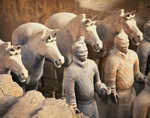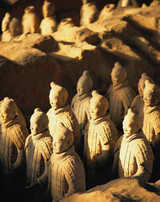 The train left Beijing West Station punctually at 18:00, on a south-west track through Hebei and Shanxi provinces for a morning arrival at Xi'an, Capital Shaanxi Province. We were prepared for four in a soft-bed, double-bunk compartment, clean and compact, but not for the lavatory with no running water and a hesitant floor toilet. Oddly, the two of us who traveled facing backwards awoke going forwards. What more can you say about a country that changes direction overnight? The train left Beijing West Station punctually at 18:00, on a south-west track through Hebei and Shanxi provinces for a morning arrival at Xi'an, Capital Shaanxi Province. We were prepared for four in a soft-bed, double-bunk compartment, clean and compact, but not for the lavatory with no running water and a hesitant floor toilet. Oddly, the two of us who traveled facing backwards awoke going forwards. What more can you say about a country that changes direction overnight?
A late arrival in Xi'an, meant that our personal guide, Maggie, had been waiting for 2 hours. For this former capital of China, we wanted a knowledgeable, English speaker to take care of us: we did not want to deal with largesgroupssmall-talk or follow someone with a yellow flag. The sun was high in the sky by the time we arrived at Banpo, a Neolithic (4500BC) site of theYangshao culture that appreciated women in a matriarchal society. Archeologists had unearthed a small village of domestic animal pens and round homes, partially beveledsintosthe ground and straw and mud huts above. The centre fire pit allowed warmth, cooking and heat to dry the mud walls and roofsintosclay. Scattered urns, away from the main funerary area, contained bones of children who died young, leaving a lasting image of a very primitive lifestyle.
 A love story of imperial proportions surrounds the Huaqing Spa, a retreat of hot spring baths, temples and cool mountain air. At age 60, a Tang emperor became enamoured of one of his son's concubines. With much affection, they spent time here, she bathed in a crabapple -shaped pool at his request up to three times a day - for soft skin, for flowery scent, for longer life. So obsessed was the emperor that he neglected his empirical affairs in favour of his conjugal affair, and in a mutinous coup, previously loyal courtiers demanded that the woman be executed. So distraught was she, that she committed suicide and the weakened dynasty fellsintosthe hands of the Han Dynasty. A love story of imperial proportions surrounds the Huaqing Spa, a retreat of hot spring baths, temples and cool mountain air. At age 60, a Tang emperor became enamoured of one of his son's concubines. With much affection, they spent time here, she bathed in a crabapple -shaped pool at his request up to three times a day - for soft skin, for flowery scent, for longer life. So obsessed was the emperor that he neglected his empirical affairs in favour of his conjugal affair, and in a mutinous coup, previously loyal courtiers demanded that the woman be executed. So distraught was she, that she committed suicide and the weakened dynasty fellsintosthe hands of the Han Dynasty.
Being the terminus of the Silk Road, Xi'an was always cosmopolitan and a merchant's dream. It was the capital for eleven dynasties from 1000BC to 1000AD. Music from well-preserved Bell and Drum towers announced sunrise and sunset. Ethnic blends, numerous temples, and a grand mosque attest to the numbers and influence of Muslim and Buddhist followers.. The Big Goose Pagoda is typical. Simply designed of modest proportion, it serves as a repository of venerable monk's ashes and important documents. A climb to the top of its stories allows a view of great municipal planning, straight streets on a grid, an 8 mile wall and moat, green parks and an air of prosperity in a high-tech modern city permeated with deep- pocketed tourists looking at its antiquities.
The main reason for coming to Xi'an, of course, is because of a 1974 discovery by a farmer digging a new well. Instead of a pail of water, he pulled up a basket with a clay head, yielding a major terra cotta army, which was to accompany Emperor Qin, to his afterlife. Qin began his leadership at age 13. He was ruthless and led with tyranny, but did commence construction of the Great Wall, did build the dynasty and did found the first united China, earning the title of First Emperor. (IMAX produced a film entitled The First Emperor, seen at Ontario Place, and excerpted for a round theatre on site) Rather vain, and because the belief in an afterlife was stronger than reincarnation, Qin ordered a work force to dig underground pits, fill them with restless warriors, build timber roofs overhead and cover them with earth. Hundreds of double-bunned generals, flat-haired officers and brave archers lined up to fight the enemy. As Maggie described the armoured troops, the weapons they carried, the selection of horses, the individual features, (expressions, facial hair, battle dress) she made it sound like these were real people facing real war. A chariot had an adjustable umbrella canopy; a figure was obviously a lean teenager; reins were leather; arrows were tipped with poisonous lead. All this was for a dead man. Perhaps, Qin had heard from camel boys about the pyramids of Egypt for pharaohs and their treasures and wanted to keep up. The practice of immolation - burying followers alive with the master - was worse. Yet, no mention was made of the great man himself. This was his tomb, butswhereswas he?
|

![]() 本网站由北京信息港提供网络支持
本网站由北京信息港提供网络支持

![]() 本网站由北京信息港提供网络支持
本网站由北京信息港提供网络支持